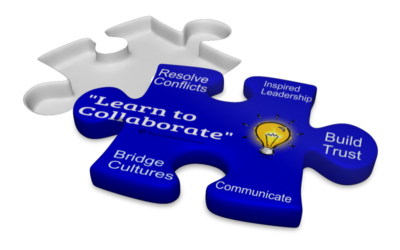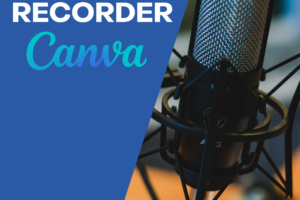Keys to Successful Partnerships
Introduction
Partnerships are successful because of the people that are part of the collaboration. When working with others, success is achieved because of individuals and the relationships they cultivate. Sometimes when we focus on the organizational level, and partner multiple agencies to tackle a program, the individual learning needs are overlooked. [Full article and podcast farther below]
Through the years of building collaborative programs, some projects would go well and some hit road blocks. This intrigued me, so I investigated further. Through academic research, interviewing leadership champions, and surveying people in a variety of partnership roles, I discovered interesting results. A missing piece was often the lack of ‘partnership training’. People don’t always automatically work well together.
Key Learning Areas
There are 5 key learning needs to set up people and their partnership projects for success: Inspired Leadership, Building Trust, Resolving Conflicts, Collaborative Communication, and Bridging Agency Cultures.

A Few Observations
The survey results, provided a collection of valuable data. A few of the observations include questions or comments that people agreed on.
Communication
What surprised me was the number of people that said they were NEVER told ‘Why their multiple organizations were working together’. Communication is very important, to make sure everyone understands each other. For example do they even have a common understanding of the problem?
Communication is especially important when there are staff changes and transitions. If there is a change in leadership, or a new employee face around the collaborative table, it is important that everyone continues on the same page. It is necessary to go back to the basics of all information, everyone started with at the beginning of the project. Strong hand-offs between the previous and new partnership players, enables ongoing and sustainable success.
Leadership
Another request people asked, was how to lead a collaborative meeting. Most leaders knew how to lead their team meetings very well, however leading a partnership meeting was more complicated. Each organization may run their meetings differently, and therefore have different expectations.
Full article is below
Successful Strategies for Online Collaboration
Collaboration requires five strategies to be successful, online these strategies must be even more intentional. “Large scale impact depends on increasing cross-sector alignment and learning among many organizations” (Kramer, 012) The elements required for organizations and individuals to collaborate are learning how to: Build Trust, Bridge Cultures, Resolve Conflict, Strengthen Communication and Cultivate Collaborative Leadership.
Bridging cultures within online collaboration between organizations, require intentionally understanding why people or agencies do what they do. Asking the questions and understanding people’s actions help bridge the differences in behaviours. Why do some people or agencies keep their camera’s off in meetings? Is it important to one agency to only book 45 minute meetings so that there are breaks in-between Zoom meetings. Intentionally asking questions and providing opportunities to develop collaborative expectations is an important element to design within meetings.
Building trust is another important element that requires time and effort. Getting to know each other is an important aspect to building relationships across agencies, especially when we are working within the online context. If organizations continue to work individually, when they are intending to work together, this could be an indication that they don’t trust each other, or trust has not been established yet. Do not skip the round table introductions, so people can build trust and therefore foster more impactful working relationships. Another way to foster collaborative working relationships is to plan for activities in small groups.
Resolving conflict is essential for good collaboration to work. If two people don’t get along, it can become a barrier for two organizations to grow referral pathways or collaborative solutions. The first step to conflict resolution may be accepting challenges as an opportunity for learning and growth. Especially in a stressful context and a world pandemic where many people are working from home, sharing internet and space, giving grace is a good first step. Online if we are able to turn on our camera, smile and actively listen to each other this is a good step towards preventing conflict in the first place. Training can often assist with the resolving of conflict, 26% of the education that collaborative projects in Niagara were in response to an issue.
Collaborative Communication online requires intentional actions. From the literature review and my experience, communication is one of the most important aspects of successful collaboration. Clear communication is an important part of ensuring that everyone involved understands the interagency boundaries, policies, procedures, client referral pathways, and interagency management with frontline exchanges. Regardless of the learning topic, effective communication is an element that should never be overlooked. Organizations are made up of individuals with different learning and communication styles and needs. Sometimes people don’t hear the information the first time, or there is a new person in a role and the onboarding didn’t include all the details. Another finding from my research was that 31% (16) of survey participants indicated they would have liked to have learned what the collaborative project goals were. Especially in the online context, intentionally planning for opportunities to communicate in a variety of ways, can produce positive results.
Leadership is what can bring everything together. “Leadership is the mechanism that makes things happen in a collaboration” (Vangen & Huxham, 2003). Leadership requires a balance of power, control, and consensus between various partners. Leading a collaborative project takes a special skill, because you are bridging cultures, and potentially a variety of ways of doing things. Ensuring that everyone’s interests are being acknowledged, understood and considered is essential for moving forward with a positive and collaborative approach.
Bringing this all together can feel like putting together a puzzle, and especially online it may feel like a puzzle piece is missing. Intentionally planning for learning experiences and opportunities to get to know each other can bridge organizational cultures and build trust. Communication must be ongoing and consider a variety of learning needs. As we grow leaders through experience and learning which grows capacity, buy-in by participants is also essential. “Effective adult learning occurs when the topic is important to the learner and when learning combines reflection and concrete experience” (Health Professions Regulatory Advisory Council, 2008). Opportunities to each have a voice and the intention to listen and learn, means that everyone will grow together. Just as the article by Cortez, Nussbaum, Woywood, and Aravena (2009) is titled, often individuals and organizations must learn to collaborate by collaborating.
For a complete reference list or if you are interested in a workshop about ‘How do we learn to collaborate, especially online’, please email us: info@regiereducation.com For 18 Quick Tips to increase engagement at your next online collaborative meeting click here for another blog, podcast and video.
Article Information also featured at Leadership Niagara: https://leadershipniagara.ca/5-successful-strategies-for-online-collaboration/ #leadershipdevelopment #leadership
Engage Your Audience
Sign-up for Facilitator Tips & Resources email member news
Subscribe to our YouTube channel!
Like us on Facebook
Pin this on Pinterest
Share on LinkedIn
Listen as a Podcast
Regier Education Online Courses
Inspired Learning Personality Quiz
About the Author

Patricia
Patricia is the founder of Regier Educational Services, helping facilitators engage the variety of learning types in your online audience. Education includes a Master of Adult Education, a BA in Psychology, and twenty years experience developing and facilitating workplace, community and collaborative training. Online learning experience designer and facilitator. Utilizing teaching adults best practices, and innovative multi-media resources to emphasize your message. Engaging content creator, facilitator and online production partner.






